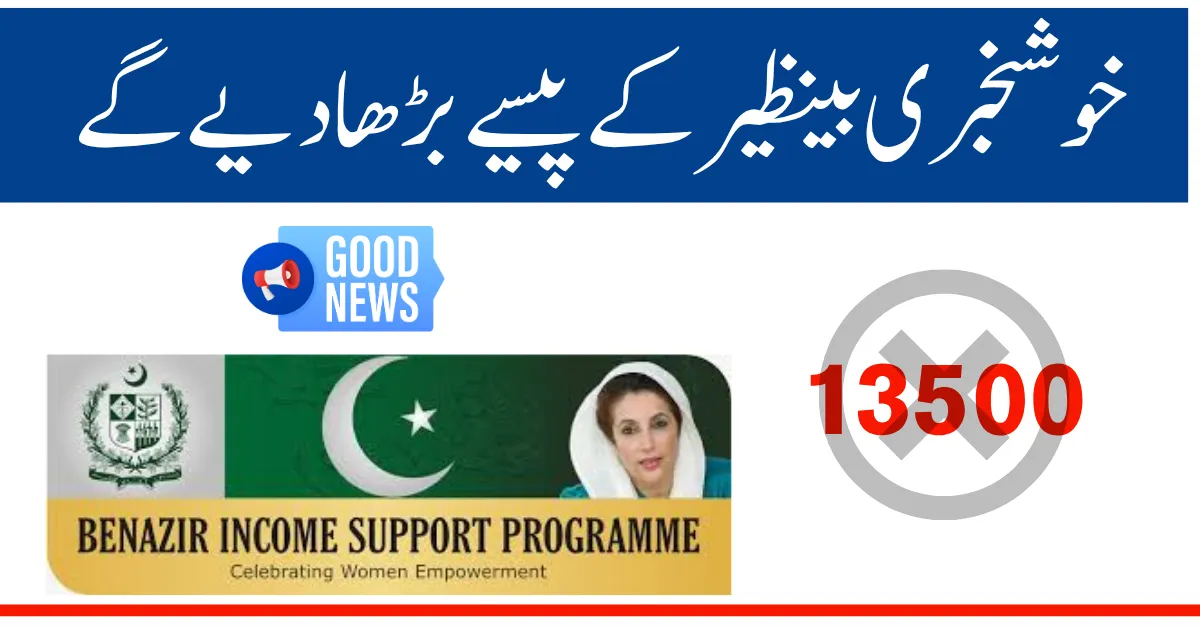The Government of Pakistan has officially announced the BISP stipend increase July 2025, bringing relief to millions of low-income families under the Benazir Income Support Programme (BISP). This decision is part of broader economic reforms aimed at tackling inflation, improving the social safety net, and uplifting marginalized communities across the country. In this article, we will cover everything from new stipend amounts, eligibility criteria, payment dates, and registration updates.
What is BISP?
The Benazir Income Support Programme (BISP) is Pakistan’s flagship social welfare initiative launched in 2008. It provides financial aid to the most vulnerable segments of society, particularly women from low-income households. Over the years, BISP has evolved into a comprehensive safety net that supports education, health, and financial stability for underprivileged families.
Key Highlights of BISP Stipend Increase July 2025
| Category | Previous Stipend (PKR) | New Stipend (PKR) | Increase (%) | Effective From |
|---|---|---|---|---|
| Regular BISP Kafalat Program | 9,000 | 11,000 | 22.2% | July 2025 |
| Education Stipend (Primary) | 2,000 | 2,500 | 25% | July 2025 |
| Education Stipend (Secondary) | 3,000 | 3,700 | 23.3% | July 2025 |
| Education Stipend (Higher Sec.) | 4,000 | 5,000 | 25% | July 2025 |
| Special Persons Allowance | 10,000 | 12,000 | 20% | July 2025 |
Government’s Objective Behind the Increase
The stipend increase reflects the government’s response to rising inflation, a depreciating rupee, and increasing poverty levels. According to the Ministry of Finance and the Planning Commission, these enhanced payments are designed to:
- Alleviate economic pressure on low-income households
- Improve school retention through increased education stipends
- Support women-led households and marginalized communities
- Expand the BISP financial support to previously excluded segments, including persons with disabilities
Updated Eligibility Criteria for BISP 2025
To qualify for the revised BISP benefits, applicants must meet the following criteria:
- Be a Pakistani national with a valid CNIC
- Belong to a low-income household (as per updated PMT score below 32)
- Not be a government employee or tax filer
- Women must be the primary beneficiaries (preferably heads of households)
- School-going children must be enrolled to qualify for education stipends
How to Apply or Re-register for BISP in 2025
If you’re not yet part of the program or your previous application was rejected, you can apply or re-register using the updated digital process:
- Visit the nearest BISP tehsil office
- Provide biometric verification through NADRA
- Fill out the dynamic survey form (PMT Score Evaluation)
- Ensure school enrollment for education stipend eligibility
- Wait for SMS confirmation from 8171
Payment Methods and Disbursement Schedule
Beneficiaries will receive the updated stipends starting from July 25, 2025. Payments will be made via the following channels:
- BISP-designated POS agents and franchises
- Partner banks (HBL, Bank Alfalah, UBL) using biometric ATMs
- Retailer outlets across the country
- Mobile banking wallets (under pilot projects in major cities)
Ensure your mobile number is updated with BISP to receive real-time payment alerts.
8171 SMS Service and BISP Web Portal
To check your BISP payment status and application eligibility:
- Send your CNIC to 8171 (standard SMS charges apply)
- Or visit the 8171 web portal for digital verification and updates
Common Issues and How to Resolve Them
Here are common issues reported by users and how to resolve them:
- “You are not eligible” message: Revisit the BISP office for re-evaluation
- Payment delays: Confirm your biometric verification is complete
- CNIC mismatch: Update details with NADRA and resubmit
- School stipend not received: Submit school attendance certificate
Government Initiatives to Strengthen BISP
The government has also announced the following reforms:
- Expansion of the Nashonuma programme for malnourished mothers and children
- Introduction of digital wallets for faster fund disbursement
- Collaboration with telecom and tech companies to enhance digital outreach
- Nationwide re-survey campaign to include more families in 2025
How This Increase Impacts Beneficiaries
This stipend increase directly impacts more than 9 million families, translating into improved:
- Food security and nutrition
- Access to education and healthcare
- Women empowerment and financial autonomy
According to social impact analysts, this increase may also have a ripple effect in boosting the rural economy and reducing urban migration.
Frequently Asked Questions (FAQs)
Q1: When will the new BISP stipend payments start?
A1: Payments with the increased stipend will begin on July 25, 2025.
Q2: Who qualifies for the new education stipends?
A2: Children of BISP beneficiaries enrolled in primary, secondary, and higher secondary education institutions.
Q3: How can I update my CNIC or mobile number with BISP?
A3: Visit your nearest BISP tehsil office with your original CNIC and a mobile SIM registered in your name.
Q4: What if I do not receive a confirmation SMS from 8171?
A4: Wait 10–15 working days, or re-check your eligibility through the BISP portal or nearest office.
Q5: Is there any fee for applying to BISP?
A5: No. All registration and application services are completely free.
Q6: Can men apply for BISP?
A6: Generally, women are preferred as beneficiaries, but men from eligible families may apply in special cases (e.g., widowhood, disability).
Q7: Will the stipend amount change again in 2026?
A7: The government has hinted at annual reviews, but no official announcement for 2026 has been made yet.
Conclusion
The BISP stipend increase in July 2025 is a commendable step toward reducing poverty and cushioning the economic burden on Pakistan’s most vulnerable communities. With improved registration processes, higher disbursement rates, and digital transparency, the initiative aims to become more inclusive and impactful.
Stay connected with BISP updates through the 8171 portal and ensure your family’s data is accurate to continue receiving benefits under this vital program.



Mohammad Rameez Multan